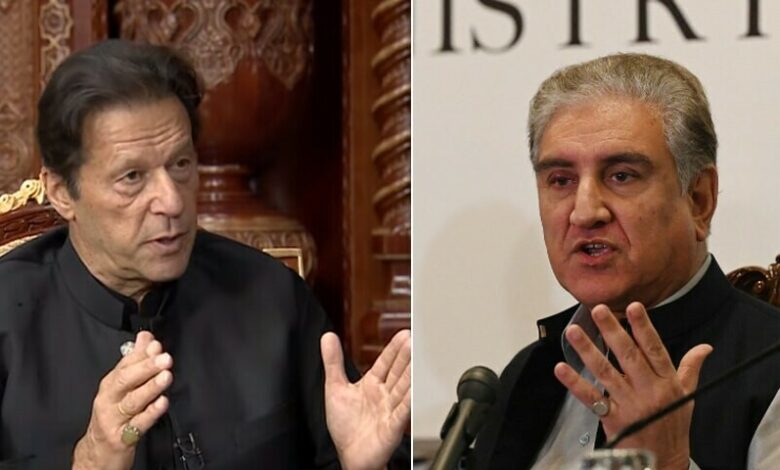Major boost for PTI as IHC acquits Imran, Qureshi in cipher case – Pakistan


In another major relief, the Islamabad High Court (IHC) on Monday acquitted PTI founder Imran Khan and former foreign minister Shah Mahmood Qureshi in the cipher case.
IHC Chief Justice Aamer Farooq and Justice Miangul Hassan Aurangzeb announced the short verdict after accepting the appeals of the former premier and diplomat against their convictions in the case.
The duo are not expected to be released from prison due to Imran’s sentence in the Iddat case while Qureshi was arrested in recent May 9 cases. The Iddat case was transferred to another judge today while Qureshi is on physical remand till June 5 (Wednesday).
A special court, established under the Official Secrets Act, had handed both Imran and Qureshi 10-year jail sentences each in the case in January after Judge Abual Hasnat Zulqarnain appointed a state counsel for them.
The cipher case pertains to a diplomatic document that the Federal Investigation Agency’s (FIA) charge sheet alleges was never returned by then-PM Imran, who long held that the document contained a threat from the US to topple his government.
Leader of the Opposition in the National Assembly Omar Ayub hailed the verdict and called for their immediate release.
Case history
The former premier and Qureshi, who is also behind bars, were first indicted in the case in October. Both had pleaded not guilty. The IHC had termed the government’s notification for a jail trial “erroneous” and scrapped the entire proceedings.
The special court had begun the cipher trial afresh in December at the Adiala district jail after Imran and Qureshi were indicted for a second time in the case on December 13.
On December 22, the Supreme Court had approved the post-arrest bails of Imran and Qureshi. While Imran remained incarcerated in other cases, Qureshi’s expected release was also stalled as he was manhandled and re-arrested in a fresh May 9 case.
Days later, Justice Aurangzeb had restrained the special court from proceeding against the suspects — including Qureshi — till Jan 11, noting that there were “legal errors” in the case.
However, the stay order on the in-camera trial was withdrawn earlier in January after the state counsel assured that the witnesses’ statements would be recorded afresh.
On January 18, the special court had recorded the statement of five witnesses, including former principal secretary Azam Khan. Other witnesses comprised Aneesur Rehman, Javed Iqbal, Hidayatullah and Mohammad Ashfaq.
Azam Khan claimed that the cipher never returned to his office and he had intimated the prime minister, his military secretary as well as the relevant staff numerous times.
The next day, the caretaker government had approached the Supreme Court challenging the IHC’s November 21 verdict that declared the trial illegal.
In a subsequent hearing, Imran had claimed that the cipher was still with the Ministry of Foreign Affairs and he received a rephrased version of the diplomatic cable.
On January 22, the special court recorded the statement of another four witnesses, including ex-foreign secretary Sohail Mehmood and former interior secretary Yousaf Naseem Khokhar.
Mehmood had said that the copy sent to the ex-PM was never returned while Qureshi said that he returned the copy to the ministry and the ex-secretary replied in the affirmative.
The next day, six more prosecution witnesses recorded their statements. Initially, there were 28 witnesses, but only 25 testified before the court after three witnesses were dropped from the list.
Besides Interior Secretary Aftab Akbar Durrani, ex-envoy to the US Asad Majeed recorded his statement in the case. When Majeed concluded that there was no word of “conspiracy” or “threat” in the diplomatic cable, Imran retorted that why the government then issued the demarche to the US.
In the next hearing, the court concluded the cross-examination of four prosecution witnesses.
The FIA prosecutor then alleged that the defence side was applying delaying tactics to prolong the trial and urged the court to close the defence counsel’s right of cross-examination. Subsequently, Judge Zulqarnain appointed Abdul Rehman and Hazrat Younis as defence counsel for both PTI leaders in the next hearing.
Imran had said his lawyers could not appear before the court as they were contesting the upcoming general elections.
He had termed the trial nothing less than a “joke”, saying that the prosecution and defence team both belonged to the government.
The two were sentenced on January 30 and subsequently appealed their convictions in the IHC in February. In March, the IHC had wondered why the FIA was probing Imran and Qureshi for not returning the diplomatic cipher, while sparing other recipients who did the same.
In a fresh twist in the cipher case, the IHC had observed last month that the FIA had nothing on record to prove that Imran retained the confidential diplomatic cable and that it went missing from his possession.
IHC transfers Iddat case to separate judge
Separately, the IHC also accepted District and Sessions Judge Shahrukh Arjumand’s plea for the transfer of the Iddat case to another court after complainant Khawar Fareed Maneka had requested Arjumand to recuse himself from hearing the appeals.
Last week, an Islamabad district and sessions court did not announce its already reserved verdict in the iddat case against Imran Khan and his spouse Bushra Bibi.
While the verdict was expected to be pronounced last week, Judge Arjumand had sought a transfer of the case and said that he would not be announcing the judgment.
Today, after Judge Arjumand had written a letter to the IHC chief justice to transfer the case, the court transferred the case to the court of Additional District and Sessions Judge Muhammad Afzal Majoka
Judge Majoka will now hear the Iddat case.
More to follow.
Source link